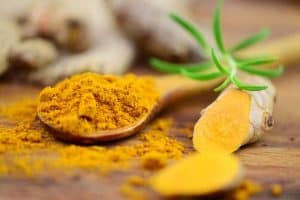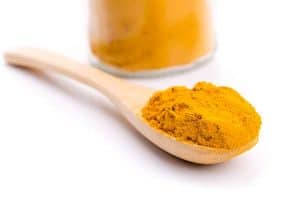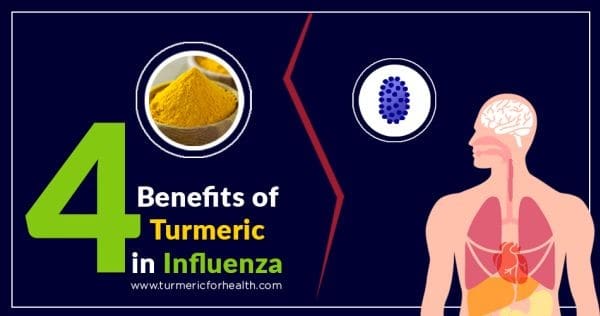Influenza or flu is a viral infection that mainly affects the respiratory system and lasts for about a week.
It is characterized by sudden onset of high fever, malaise, body ache, cold, sore throat, and cough. This is different from the stomach flu which is a gastrointestinal infection.
There are three types of influenza viruses: A,B and C. One of the recent outbreak were that of a new type of influenza A/H1N1 virus.
The influenza virus is transmitted via droplets from sneeze or coughs and can be spread through the objects which the patient has touched.
Frequent washing of hands with soap can inactivate the virus and prevent the spread of disease.
Vaccinations and antiviral drugs are available.
However, due to side effects and the development of drug-resistant viruses, there is a need for safer options.
Table of Contents
4 Benefits Of Turmeric In Influenza/Flu
Turmeric is a spice that belongs to the ginger family. It has a strong aroma and taste and its powder has a characteristic golden yellow hue.
Curcumin is its most important bioactive ingredient and the herb is blessed with a number of exceptional medicinal properties.
Turmeric milk is commonly used in India as a remedy for cold and today we will understand the modern science behind it.
Turmeric is a broad spectrum anti-microbial agent: it has virucidal properties against many viruses.
Most viruses have a specific structure wherein the portion that causes infection is covered by an encapsulating region.

A study proves that curcumin specifically inhibits the activity of such viruses and very low concentrations of curcumin are required to deactivate the influenza virus.
Lab studies demonstrate that curcumin inhibits the activity of avian flu viruses. National Chung Hsing University, Taiwan discovered a novel activity of curcumin in relation to influenza virus.
Haemagglutinin is a protein that is present on the surface of viruses and it uses this protein to invade other cells. Interestingly curcumin interferes in this activity and prevents replication and invasion of the virus.
Further, the study demonstrated that curcumin acts at early stages of infection and it inhibits the activity of a protein called nuclear factor kappa B which controls inflammation and reducing its activity lowers replication of the virus.
They also proved that unlike other anti-viral drugs that give rise to drug resistant strains, curcumin does not cause any drug resistance.
Neuraminidase is another protein present on the surface of Influenza A virus and it plays an important role in spreading the infection.
Many anti-viral drugs have been developed to inhibit the activity of this protein but there are certain drawbacks: side effects, low bioavailability, and development of drug-resistant strains.
A group of Korean researchers showed that curcumin and other curcuminoids inhibit the activity of this protein and display anti-viral activity against H1N1 and drug resistant H1N1 strain.
Computer based studies show that derivatives of curcumin also exhibit anti-influenza activity.
However, their activity is not as potent as that of curcumin.
What does this mean?
Curcumin and curcuminoids interfere in the invasion process of viruses and prevent them from infecting and further multiplying in the body. It also inhibits the activity of the avian flu (H1N1) virus.
Germacrone, a compound isolated from turmeric oil is found to inhibit replication of influenza viruses. It acts against influenza A and B virus. It prevents entry or attachment of the virus to cells and also inhibits replication.
Additionally, it protects from lethal infection, reduces the virus population in the lungs and acts in combination with other anti-viral drugs.
A study shows that zedoary turmeric oil inhibits the activity of influenza and parainfluenza I, II and III virus. Zedoary turmeric oil spray can be used to treat respiratory tract infections.
What does this mean?
Turmeric’s anti-viral property is not limited to curcumin alone. Essential oils from turmeric and related species exhibit anti-viral property.
3. It aids in reducing fever and cold
Turmeric milk is a household remedy in India to fight fever and cold. Fever is generally caused due to infection or inflammation.
Nuclear-factor kappa B is the master of the inflammation process. It regulates the activity of genes that cause the production of pro-inflammatory chemicals.
Animal studies prove that curcumin blocks nuclear factor-kappaB activity and prevents the production of pro-inflammatory chemicals like tumor necrosis factor and interleukins. In this manner it reduces fever.
Turmeric oil is proven to relieve cough and sputum and is said to be therapeutic in respiratory disorders.
What does this mean?
Turmeric’s anti-inflammatory property helps in reducing fever and relieving cold and cough.
4. It boosts the immune system

Turmeric has anti-inflammatory, antioxidant, anti-cancer, anti-microbial and a number of other pharmacological properties. (Read 20 Reasons Why Turmeric Is An All-In-One Herb)
In the case of inflammation, turmeric lowers the activity of the immune system. Interestingly in times of generalized weakness or in case of infection, turmeric serves as immune-stimulatory agent.
Studies prove that both turmeric extract and curcumin raise the activity of the immune system and immune cells and this is thought to be useful in case of patients whose immunity is compromised.
What does this mean?
Turmeric can boost your immune system to fight flu like systems and restore health.
Dosage of Turmeric For Influenza
But the best way to relieve a cold and flu is to consume Turmeric tea or Turmeric milk. Nothing works faster and better than this.
You can take Golden Paste. Start with small doses such as 1/4-1/2 tsp and if you see no side effects then increase the dose gradually to 1-2 tsp 2-3 times a day over a few weeks.
It is best taken with food to avoid acid reflux. Avoid taking it at the same time when you take other meds.
For more details on this read Turmeric & the Flu.
Precautions
Turmeric is absolutely safe as a spice but anything in excess is dangerous. Mild gastrointestinal symptoms are possible when you first start with turmeric.
A few conditions in which turmeric supplements should be avoided are:
- Pregnancy and lactation
- Prior to surgical procedures
- If suffering from gall bladder problems
- If taking blood thinning or stomach acid reducing medications
If you have a tendency of developing kidney stones or suffer from gout limit turmeric spice intake.
Always consult a doctor before taking any supplement.
Conclusion
There is no doubt that turmeric can ward off flu and its related symptoms.
It is an age-old remedy that has been passed on to many generations in India and other Asian countries and I recommend it from personal experience.
And it is great to hear that modern science also backs this concept. Please keep sharing your experience with turmeric.


I heard on News that Asians are flocking to buy Turmeric plants to avoid Corona Virus. Is it true it wards off flu .
I have been taking it as a milk in the morning and am taking a blood thinner with no problem.
Is taking fresh turmeric with food safe when taking stomach acid reducing medication
Yes. Including turmeric in your diet should not pose any risk when taking stomach acid reducing medication.